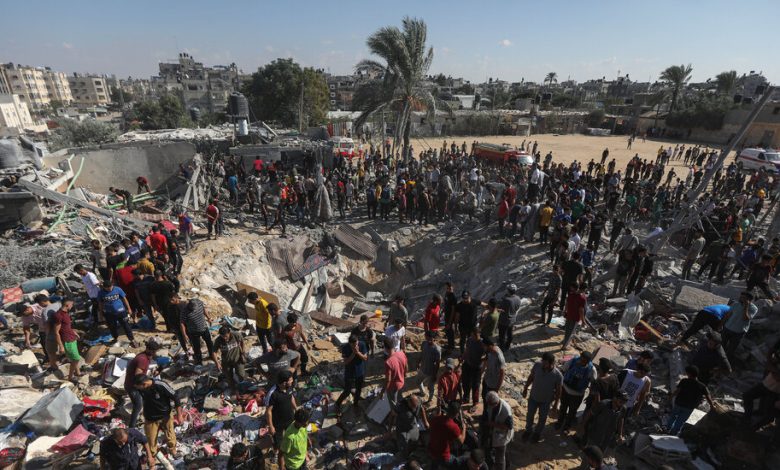Deal Lays Groundwork for Aid to Reach Desperate Gazans, Officials Say

On one side of the border crossing between Egypt and Gaza sit more than 100 trucks packed with desperately needed food, water and medical supplies. On the other wait more than 2 million Gazans now scraping by on dwindling stocks of basic human necessities.
Between them stand a series of locked gates and fences topped with razor wire, and nearly a week of diplomatic wrangling that finally appears to be bearing results. Officials and aid workers on Thursday were hammering out the logistics of opening the gates, saying that a U.N.-led deal had laid the groundwork to allow trucks carrying humanitarian aid to enter Gaza from Egypt, offering the renewed promise of relief to the besieged enclave.
Aid organizations were told that the crossing would open on Friday morning, according to an aid official who was not authorized to discuss the matter publicly and spoke on condition of anonymity.
The deal, officials said, includes the U.N. flag being raised at the crossing and international observers inspecting aid trucks before they enter Gaza. The arrangement is meant to satisfy demands by Israel, which is at war with Hamas, that none of the aid reach the group that controls Gaza and that the shipments not be used to smuggle weapons.
Opening up the border crossing at the Gazan city of Rafah — the sole official passage between the territory and Egypt — has taken on particular urgency with the enclave sinking into a deepening humanitarian crisis.
In the aftermath of the deadly Oct. 7 surprise attack by Hamas, Israel, aided by Egypt, has imposed a complete blockade of Gaza, not allowing essentials to enter or people — including hundreds of foreigners caught in the strip when war broke out — to escape. Israel has waged an intensive bombing campaign of the strip and directed about 1.1 million people to evacuate northern Gaza and head to the south, closer to Egypt.
Supplies of every sort are nearly depleted — included in the aid waiting in Egypt are no-training-needed home birthing kits that include basics like soap, plastic sheets and scissors.
The possible breakthrough on aid delivery came amid protests in multiple countries after the explosion Tuesday night that killed hundreds of people at a hospital in Gaza City. Hamas and its allies say it was an Israeli airstrike; Israel says it was a malfunctioning rocket fired by Palestinian militants, and the United States has said its preliminary intelligence supports that assessment.
Israeli officials remain wary that the conflict could widen beyond Gaza. Israel and the militant group Hezbollah have traded artillery fire across Israel’s northern border with Lebanon, clashes on the West Bank have killed dozens of Palestinians, and Iran has repeatedly hinted at marshaling its allies across the Middle East for a broader war against Israel.
On a brief trip to Israel, President Biden said Wednesday that he had secured a commitment from Israel to safely allow food, water and medicine to pass through the Rafah crossing as long as it did not reach Hamas, and that Egypt had said it would allow an initial convoy of 20 aid trucks into the enclave, without specifying when.
By Thursday, as diplomats, U.N. officials and aid workers were working out technical details, Egyptian authorities had dispatched the heavy machinery needed to repair roads near the crossing, according to an aid official briefed on the situation and a person who works at the crossing, both of whom asked not to be named because they were not authorized to speak about the status of the aid. The area has been hit repeatedly in Israeli airstrikes, and Egyptian officials have suggested it is unable to accommodate large trucks laden with supplies.
Activity also appeared to be picking up near the crossing, where volunteers accompanying an Egyptian government-sponsored aid convoy had been camping out since Wednesday. Security on the Egyptian road leading to the crossing tightened on Thursday, with officers stopping cars and checking the IDs of those inside.
Israel was also talking behind the scenes with Egypt, diplomats said, discussing the mechanics of the aid delivery, including whether a brief cease-fire could be declared for enough time to allow the supplies to safely enter Gaza. In addition to the bombardment, there has been talk of an imminent Israeli ground invasion to wipe out Hamas, making the need to secure safe passage for the aid trucks that much more urgent.
For Gazans, the talk of imminent aid deliveries was tempered by the dashed hopes of the past week. Diplomats have repeatedly said they had secured a deal to allow aid in and foreigners out, only to see roadblocks put in place by Israel and Egypt remain in place.
“Getting bread and water has become very challenging,” said Yousef Hammash, an aid worker with the Norwegian Refugee Council who days ago left his house in the north of Gaza following Israeli warnings to move south ahead of the threatened invasion.
He and his extended family, who fled their homes with him, were among the luckier ones: They have relatives to stay with in Khan Younis, in southern Gaza. Tens of thousands of others are sleeping in the U.N.-administered shelters, or simply in the streets in southern cities that have not been spared Israeli bombing.
“The city just doesn’t have the capacity to cover the needs of everyone that came here seeking safety,” said Mr. Hammash in a voice message, the sounds of drones whizzing in the background. “We are talking about thousands of people who suddenly became homeless, who have nothing.”
European Union officials coordinating aid from the bloc were optimistic that trucks would be able to cross into Gaza. The E.U. alone has 54 tons of aid sitting not far from the crossing in Arish, a city in an area of northeastern Egypt that is closed to non-Egyptian officials. It sits in a province where Egypt has fought militants for years, and the government in Cairo is wary of any spillover from the Gaza conflict.
Major humanitarian groups including the World Health Organization and the International Committee of the Red Cross also have sent equipment and supplies.
“Our trucks are loaded and ready to go,” Dr. Tedros Adhanom Ghebreyesus, the director general of the World Health Organization, said in a virtual news conference. “We’re working with Egypt and Palestine Red Crescent societies to deliver our supplies into Gaza as soon as the border crossing is opened, hopefully tomorrow.”
Throughout the day and into the night on Thursday, Egyptian officials held intensive talks in Cairo with the U.N. secretary general, António Guterres; his humanitarian chief, Martin Griffiths; and a special U.S. envoy about how to deliver the aid to Gaza.
Hamas, which controls the Gaza side of the crossing, said it had not yet received word to open it up for aid to get through.
“All of Gaza is waiting for the aid,” Wael Abu Omar, the spokesman for the Rafah crossing at the Hamas-run interior ministry, said Thursday. “Of course we’ll let the aid through.”
Earlier discussions around opening the crossing had included efforts to get foreign nationals out of Gaza. E.U. and other Western officials said on Thursday that there had been no progress on that front. There are approximately 350 to 400 Americans; 1,200 E.U. citizens; 300 Canadians; 200 British citizens and 45 Australians in Gaza, according to diplomats.
Many have been waiting on the Gaza side for days in hopes of leaving. Every day, scores of them pack what personal belongings they can carry into suitcases and garbage bags and head toward the gate in hopes of securing an escape
Others do not make it all the way there. Yousef Abu Shaaban, a Palestinian American, had packed his bags on Wednesday morning in hopes that he would leave Gaza with his family the following day. They had already waited for hours at Rafah twice in the past five days, and hoped they would get lucky on their third try.
Instead, an Israeli strike hit the outside of their home that night, injuring the entire family and killing his 14-year-old sister.
Mr. Abu Shaaban, 18, who was born in Michigan, said that if a deal were struck to let foreigners leave Gaza, he was no longer sure he would be one of them.
“They would have to take us out in an ambulance,” he said. “I can’t walk.”
Iyad Abuheweila contributed reporting from Cairo, Mourad Hijazy from Arish, Egypt, and Hiba Yazbek from Jerusalem.




